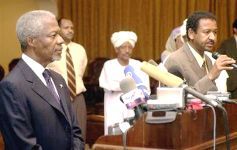Sudan urges `reasonable’ UN SG action as deadline expires
By ED JOHNSON, Associated Press Writer
AL-FASHER, Sudan, Aug 30, 2004 (AP) — As a U.N. deadline expires for Sudan to ease the crisis in Darfur, the situation on the ground in this western region remains bleak – villagers forced from their homes by Arab militia still must find refuge in camps for the displaced, and reports that the Sudanese military is bombing villagers from helicopter gunships continue to surface.
 The Sudanese government, which was given 30 days by the U.N. to rein in Arab militiamen or face penalties, appealed on Monday to the Security Council to take a “reasonable decision.”
The Sudanese government, which was given 30 days by the U.N. to rein in Arab militiamen or face penalties, appealed on Monday to the Security Council to take a “reasonable decision.”
“Of course we are concerned,” Foreign Minister Mustafa Osman Ismail told Associated Press Television in Khartoum, the capital. “We wish…the relationship with the Security Council will not be the way of confrontation. We hope it will be in the form of cooperation.”
His remarks came as a U.S. State Department official made a final firsthand U.S. assessment of conditions for thousands of displaced people in Darfur, and a contingent of 155 Nigerian soldiers arrived, swelling the ranks of an African Union mission monitoring a shaky cease-fire between government troops and rebels.
Three U.N. teams report Tuesday to U.N. Secretary General Kofi Annan on whether the government is doing all it can to disarm the Arab militia.
Known as Janjaweed, the militiamen are blamed for killing and raping black African villagers and for driving more than 1 million people from their homes, sparking what the U.N. has called the world’s worst humanitarian crisis.
The Security Council will meet Thursday and consider whether to follow through with its threat of unspecified action against Khartoum. The U.S. has advocated sanctions against the government.
“We hope the Security Council will come out with a reasonable decision that will help us to continue working together,” Ismail said, speaking in English.
Constance Berry Newman, assistant U.S. secretary of state for African affairs, touched down at Al-Fasher airport in a U.N. World Food Program twin-engine plane. She was briefed by aid agencies and U.N. officials before touring Abu Shouk camp, home to some 43,000 villagers driven from their homes in 18 months of fighting between government troops and rebels.
Ismail refused to see Newman in Khartoum, with the official Sudanese news agency quoting him as saying it was in protest of the U.S. State Department failing to help it keep its embassy open in Washington. Sudan announced Wednesday the embassy had closed after being unable to find a bank that would handle its financial matters, and that it had sought State Department help in finding another bank.
Children clamored around Newman as she visited one of 200 classrooms in the camp, where students sat in the shade on mats to learn about basic sanitation and the importance of clean drinking water.
She later watched as aid workers inoculated babies against measles. Newman refused to speak with journalists during her visit.
Human rights groups, the U.S. Congress and U.N. officials accuse the government of trying to crush the rebellion by backing the Janjaweed -allegations Khartoum repeatedly denies.
Dennis McNamara, a senior official in the U.N. Office for the Coordination of Humanitarian Assistance, told reporters in Nairobi, Kenya, on Monday that attacks on civilians have continued in Darfur and too little has been done to stem the humanitarian crisis.
Women and girls still are being raped by militiamen as they leave camps to collect firewood, McNamara said. The government hasn’t done enough to stop the attacks, he said, noting there is no functioning, independent justice system in Darfur.
Efforts to forge peace between rebels and the government at talks in Abuja, Nigeria, have so far proved fruitless, with each side accusing the other of violating the April 8 cease-fire.
